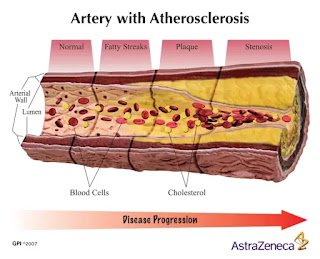BLOCKED
ARTERY SYMPTOMS & SILENT HEART ATTACKS
Early
recognition of blocked artery symptoms is vital.
Blocked arteries
obstruct the free flow of blood throughout the body, restricting the supply of
oxygen to the heart and other vital organs. When the obstructions become very
severe, blood flow to the heart is restricted, often resulting in shortness of
breath or angina.
Recognizing the
symptoms early can help to prevent cardiac arrest and potentially save a life.
The blocked artery symptoms an individual will experience may vary, depending
on which arteries are affected.
Artery with
Atherosclerosis
Symptoms that
could indicate blocked arteries
Early symptoms
of blocked arteries include:
- chest pains
- headaches
- difficulty breathing
- infection (though it may be
difficult to detect infection early on)
Because these
are all rather minor symptoms, they typically go unchecked and blocked arteries
often remain undiagnosed until the condition becomes life threatening.
Angina is a very
strong indicator of blocked arteries.
Over time, as
fat and cholesterol become deposited on the artery walls, they begin to form a
thick plaque, causing the arteries to narrow and harden. As a result, blood
flow is slowed or can even be blocked entirely. The coronary arteries, which
supply oxygen rich blood to the heart, are especially vulnerable to this
buildup of fat and cholesterol.
Angina it is sometimes confused with indigestion. It typically feels like
a squeezing pressure or pain in the chest. Individuals experiencing chronic
chest pain should visit their doctor as soon as possible.
Blocked
artery symptoms should be checked.
Symptoms will
usually disappear in less than 24 hours, but this is a serious condition and
medical attention should be sought as soon as possible.
Carotid
arteries can also be affected.
Other arteries that may be affected by blocked artery symptoms are the carotid arteries, which are located in the neck and are responsible for supplying blood to the brain. If a blockage forms here, lack of oxygen to the brain can cause a stroke or even death. Symptoms of a carotid artery blockage include dizziness, headaches, numbness on one side of the body, impaired vision, and difficulty speaking.




No comments:
Post a Comment